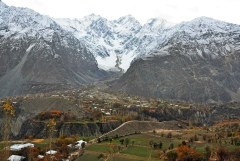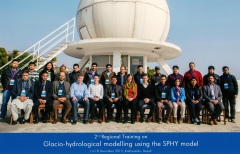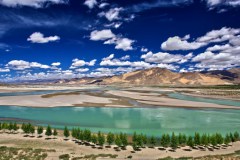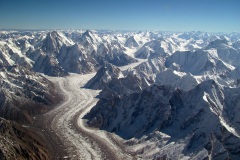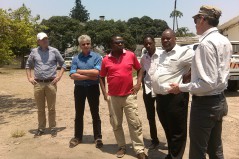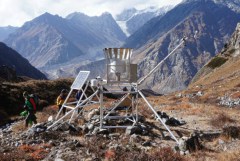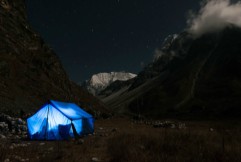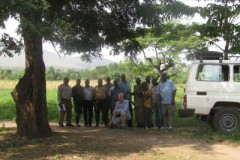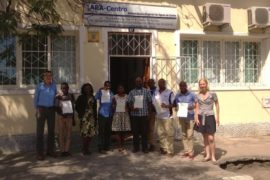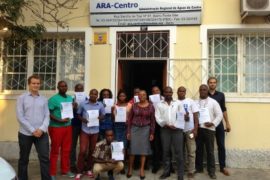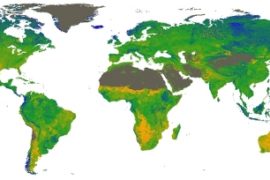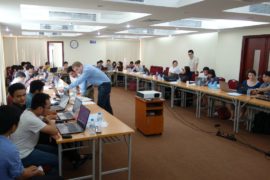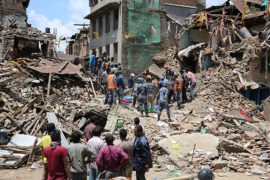Nieuws in 2015
22 december 2015
Sneeuwval Himalaya zwaar onderschat
Er valt ongeveer twee keer zoveel sneeuw en regen in het Himalayagebergte als aanvankelijk werd gedacht. Dit concluderen onderzoekers van de Universiteit Utrecht, FutureWater en het International Centre for Integrated Mountain Development (ICIMOD) uit hun onderzoek in het stroomgebied van de Indus. De resultaten verschenen eind november in het tijdschrift Hydrology and Earth System Sciences....
22 december 2015
Second regional training on glacio-hydrological modeling using the SPHY model in Kathmandu, Nepal
The Hindu Kush-Himalayan region is highly dynamic as there are many socio-economic and environmental drivers at play, including climate change. The impacts of these changes challenge the resilience of natural and human capacities and environments in the region. Recent studies have shown that the Himalayan region and the downstream areas that depend on its water...
9 december 2015
Launch of The Himalayan Climate and Water Atlas at COP21
On 11 December the HKH Water Atlas (‘The Himalayan Climate and Water Atlas: Impact of Climate Change on Water Resources in Five of Asia’s Major River Basins’) will be launched at the 2015 United Nations Climate Change Conference (COP21). The conference is held in Le Bourget, Paris, France from 29 November to 11 December. The...
9 december 2015
FutureWater present at the kick-off meeting of the IMPREX project
From November 30th to December 2nd. Johannes Hunink and Sergio Contreras attended the IMPREX kickoff meeting held in the headquarters of the Royal Netherlands Meteorological Institute (KNMI) in Utrecht (The Netherlands). IMPREX (IMproving PRedictions and management of hydrological EXtremes) is a research and innovation action funded by the H2020 European Programme which aims to improve the tools...
7 december 2015
Open webinar on the impact of climate change on the Asian Water Towers
The high mountain ranges in Asia are also called the Asian Water Towers, providing water resources for the densely populated downstream areas, where millions of people depend on the water coming from upstream. The water generated in the high Asian mountains feeds into the world’s largest irrigation schemes and reservoirs. Downstream water demands are high,...
30 november 2015
Expanding the Third Eye project in Mozambique
The Third Eye project has been operational now for a few months in the regadios, irrigation schemes of Chokwe (HICEP) and Xai Xai (RBL). During the past weeks our field officer, Jan van Til, was in Mozambique to monitor the project progress and to acquire new partnership and collaborations. Jan visited 4 flying sensor operators...
12 november 2015
HI-AWARE training for the use of High Altitude Monitoring equipment
FutureWater co-organized a training course for HI-AWARE team members in the use high-altitude monitoring equipment at Koenders Instruments in the Netherlands. Participants from ICIMOD, PARC, PMD, TERI and FutureWater met during 3rd November until 6th November at Koenders Instruments in the Netherlands to be trained in the installation and operation of various hydrometeorological equipment, which...
10 november 2015
Resuming research in Nepal after the earthquake
Dr. Walter Immerzeel participated in an expedition to the Langtang region in October 2015 together with a group of scientists and a journalist from ICIMOD. It was the first time after the earthquake in April 2015 for the scientists to return this area, where they have been working for the past few years. It was...
6 oktober 2015
Launch of InfoSequía.es: Web-portal on the drought status of the Iberian Peninsula
FutureWater launches InfoSequia, a website with data updates on the drought status of the Iberian Peninsula. InfoSequía provides weekly drought bulletins with maps of satellite-based drought indices that complement hydrological drought indices used by Spanish Water Basin Authorities. In Spain drought management is regulated by Law 10/2001 of the National Hydrological Plan which requires: 1)...
17 september 2015
Pilot study started for a Payment for Watershed Services Scheme in Uganda
Last week FutureWater participated in the inception meeting organized by WWF in Uganda, on the Hydrological and Agronomic Study for a Payment for Watershed Services Scheme in Rwenzori Mountains National Park, Uganda. This is a pilot study within a larger project coordinated by WWF, called “Sustainable Financing of the Rwenzori Mountains National Park (SFRMNP) Project”...
23 augustus 2015
Successful second training week in Water Allocation Modeling in Mozambique
During the week of 3-7 August, training in Water Allocation Modeling (using WEAP) was provided to 3 ARAs (water boards) in Mozambique, being ARA-Centro, ARA-Centro-Norte, and ARA-Norte. This training was funded by NUFFIC’s Tailor-Made Training Programme, which is part of the Netherlands Fellowship Programmes (NFP II), and is specifically meant to enhance the overall functioning of...
17 augustus 2015
Successful first training week in Water Resources Modeling in Mozambique
During the week of 27-31 July, training in Water Resources Modeling (using SPHY) was provided to 3 ARAs (water boards) in Mozambique, being ARA-Centro, ARA-Centro-Norte, and ARA-Norte. This training was funded by NUFFIC’s Tailor-Made Training Programme, which is part of the Netherlands Fellowship Programmes (NFP II), and is specifically meant to enhance the overall functioning...
31 juli 2015
FutureWater’s Global Maps of Soil Hydraulic Properties Available
FutureWater has developed global maps of soil hydraulic properties to support hydrological modelling. The maps, at a resolution of 1 km world-wide, are now available. The maps are produced by combining the best soil information at global scale and most up-to-date pedo-transfer functions currently available. Soil information is the basis for all environmental studies. Since...
22 juli 2015
Lancering van Natuur Verdrogingsmonitor app voor natuurgebieden in Brabant
Sinds kort is de Natuur Verdrogingsmonitor opgenomen in de app store van Apple en daarmee vrij beschikbaar. Deze app is een resultaat van het SWIMM project, uitgevoerd door KnowH2O, FutureWater, KWR en Hoefsloot Spatial Solutions in opdracht van de Provincie Noord-Brabant. Hierin is het door FutureWater ontwikkelde SPHY-model ingezet om de waterhuishouding in de bodem...
8 juli 2015
SPHY v2.0 published in Geoscientific Model Development
In response to various water-related challenges, FutureWater and its partners have developed the Spatial Processes in HYdrology (SPHY) model and applied the model in various research projects. SPHY is a state-of-the-art, easy to use, robust tool, that can be applied for operational as well as strategic decision support. We are now proud to announce that...
26 juni 2015
SPHY model toepassingen binnen Nederland
Het door FutureWater ontwikkelde “Spatial Processes in HYdrology” (SPHY) model, wat onlangs geplubliceerd is in het internationaal wetenschappelijk tijdschrift “Geoscientific Model Develpment” (GMD), wordt momenteel, naast de vele buitenlandse toepassingen (o.a. Chili, Nepal, Roemenië, Tanzania, Vietnam), ook succesvol toegepast binnen een aantal projecten in Nederland. Hierbij wordt SPHY vooral toegepast om het bodemvocht in de wortelzone,...
12 juni 2015
ThirdEye project website now online: ThirdEyeWater.com
Farmers are confronted with a lack of knowledge on where and when to apply their limited resources as water, fertilizer, and seeds. A key factor in enabling an increase and efficiency in food production is providing farmers with relevant information. Such information is needed as farmers have limited resources (seed, water, fertilizer, pesticides, human power)...
4 juni 2015
Successful SPHY training provided to Vietnamese water professionals in Hanoi
On June 2, 2015, Thuy Loi University in Hanoi hosted a short course for professionals from Vietnamese organizations to transfer knowledge and technology on water resources modelling. This training for professionals was organized in the framework of the NICHE project Improvement of higher education in water management in view of climatic change in Vietnam, financed...
21 mei 2015
Upcoming training course: Water resources modelling using the SPHY-model (October 2015)
In October 2015 FutureWater offers a training course on water resources modelling using the Spatial Process in Hydrology (SPHY) model in Wageningen, the Netherlands. In response to various water-related challenges, FutureWater and its partners have developed the Spatial Processes in HYdrology (SPHY) model and applied the model in various research projects. SPHY is a state-of-the-art, easy to use,...
1 mei 2015
Earthquake Nepal: Post-event risk and impact assessments
The magnitude 7.8 Gorkha earthquake that struck Nepal on April 25, 2015, caused extensive damage in Kathmandu Valley and severely affected Nepal’s rural areas. The Langtang Valley in the Rasuwa district was particularly hard hit, as became apparent after pictures taken by a rescue helicopter mission on April 26 (link). Numerous tourists and Nepali were,...
29 januari 2015
Spatial Processes in Hydrology (SPHY) model website online
Sinds 2011 ontwikkelt FutureWater het Spatial Processes in Hydrology (SPHY) model: een ruimtelijk gedistribueerd hydrologisch model dat gebruikt wordt in tal van toepassingen binnen Nederland en wereldwijd. SPHY wordt succesvol gebruikt in veel van onze projecten waaronder impact-studies voor klimaatverandering, water en energie toepassingen, irrigatiebeheer en operationele diensten. Voor het SPHY model is een nieuwe...
